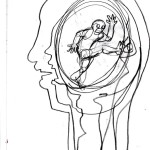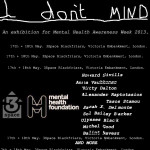Lee Millan writes:
This week, 13th-19th May, is Mental Health Awareness Week. Most of us will know one family member affected by mental illness. It’s one of the most common but less spoken of difficulties. Statistically, with one in four of us experiencing a mental health problem at some point in our lives, mental illness ranks as one of the nation’s biggest health problems, alongside cardiovascular disorders and cancer. And yet, there is still much stigma attached to it.
Mental health illness is not just the strange man up the road constantly talking to himself or the old woman walking down the road taking pictures of everyone that goes by… it is a problem that can take many forms including depression, schizophrenia, eating disorders, anxieties, phobias, drug and alcohol abuse and post-traumatic stress disorder. As part of Mental Health Awareness week, ‘I Don’t Mind’ is an exhibition by Howard Sivills in association with Ferodo Bridges, which explores some of the ideas, myths and perceptions about mental health. Howard Sivills is the main curator of the exhibition. He spoke to Lee Millam on how the exhibition came about. Here’s the audio: I Don’t Mind
The American Diagnostic and Statistical Manual of Mental Disorders (DSM) comprehensively lists mental disorders, and it is used widely by psychiatric practitioners to diagnose patients. On May, 22nd the fifth edition of the manual, DSM-5, will be published.
Previous DSM editions have attracted both praise and criticism. Some critics argue that the DSM approach is an unscientific system that enshrines the opinions of a few powerful practitioners; while others, like Professor Sue Bailey, president of the Royal College of Psychiatrists, have praised it for standardising psychiatric diagnostic categories and criteria and improving patient outcomes. Nevertheless most professionals seem to acknowledge that diagnosing psychiatric disorders is an imperfect science and mental health is an increasingly contested field. Just this week, the British Psychological Society, the leading body representing Britain’s clinical psychologists, have declared that there is no scientific evidence that psychiatric diagnoses such as schizophrenia and bipolar disorder are valid or even useful.
DSM-5 contains some new categories of mental disorder. Some of these new additions been described as “daft” even by experts broadly supportive of the DSM, like Professor Simon Wessely, chair of Psychological Medicine at King’s College London. Critics have angled psychiatry is “medicalising normality”; can or should temper tantrums and depression, for example after the loss of a loved one, really be classified as mental disorders? Or, should these states of mind just be seen as part of life’s experiences? Surely, grief is a natural response to the death of a loved one? Do not all children lose their temper from time to time?
Some professionals are now questioning the role of those who may have a vested interest in diagnosing and treating new disorders. The recent article in the British Medical Journal (BMJ) ‘Are antidepressants overused?’ reports that “three-quarters of the experts who wrote the definitions of mental illness had links to drug companies” while data reported in the Guardian cited a 30 percent increase in prescriptions for antidepressants in England between 2008 and 2011, despite their dubious efficacy. According to the BMJ, only one in seven people on antidepressants report they benefit from taking the drug.
‘I Don’t Mind’ is showing at Audit House on Victoria Embankment on 17th and 18th May between 11am and 6pm. Come in and have a look.
You can read more from experts on both side of the debate: ‘Do we need to change the way we are thinking about mental illness?‘
Kings College London will be holding an international conference on the impact of DSM-5, 4-5th June 2013. DSM-5 and the Future of Psychiatric Diagnosis: Where is the roadmap taking us?
Also, Have a listen to our podcast ‘Yoga and mental health‘, Esther Gaytan-Fuertes speaks to Veena Ugargol, of the Minded Institute, about her research on the benefits of Yoga for stress-related mental disorders.
Image courtesy of Jacob V. Joyce



Hey there! This is my 1st comment here so I just wanted to give a quick shout out and tell you I really
enjoy reading your posts. Can you recommend any
other blogs/websites/forums that go over the same subjects?
Many thanks!